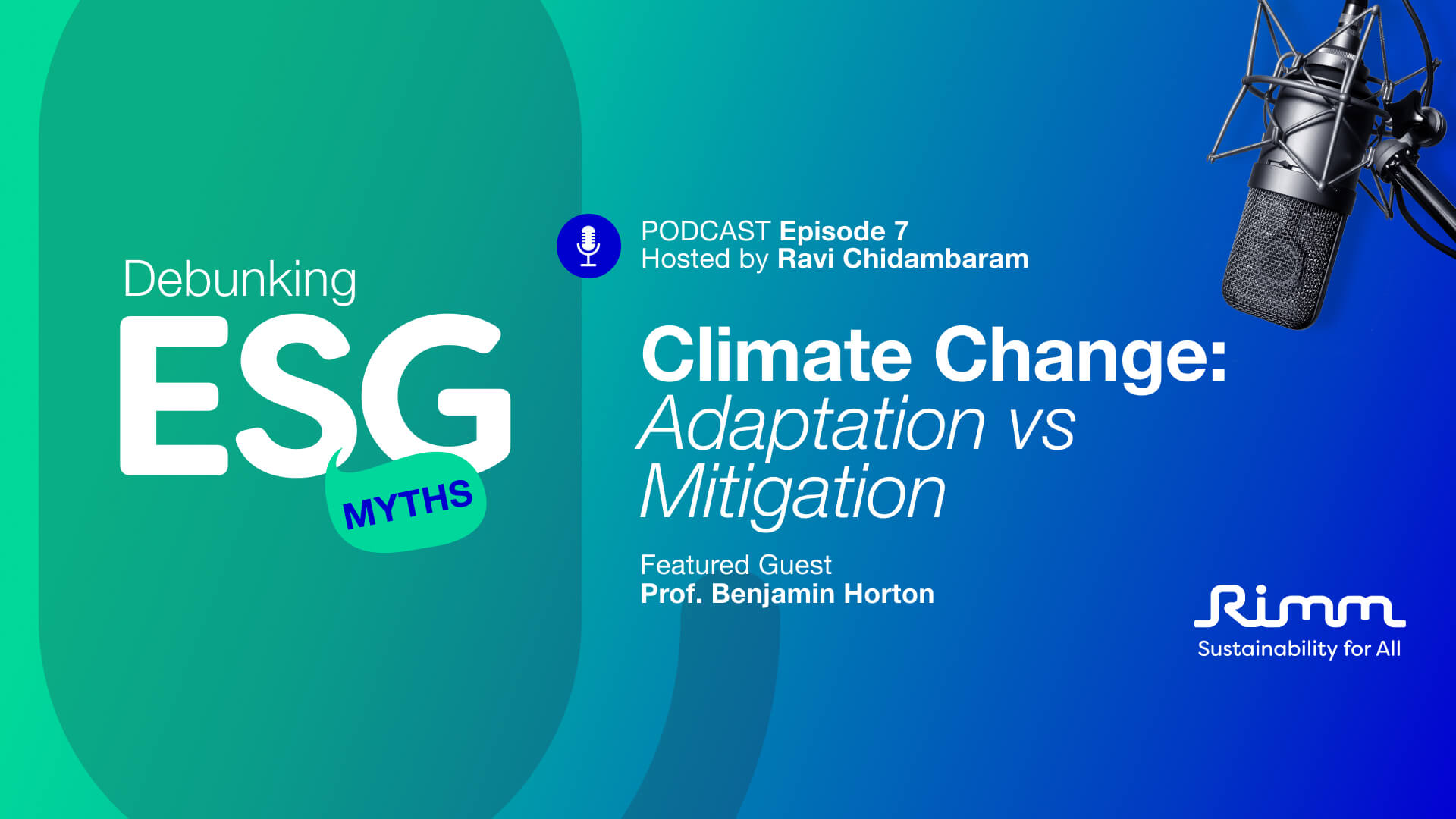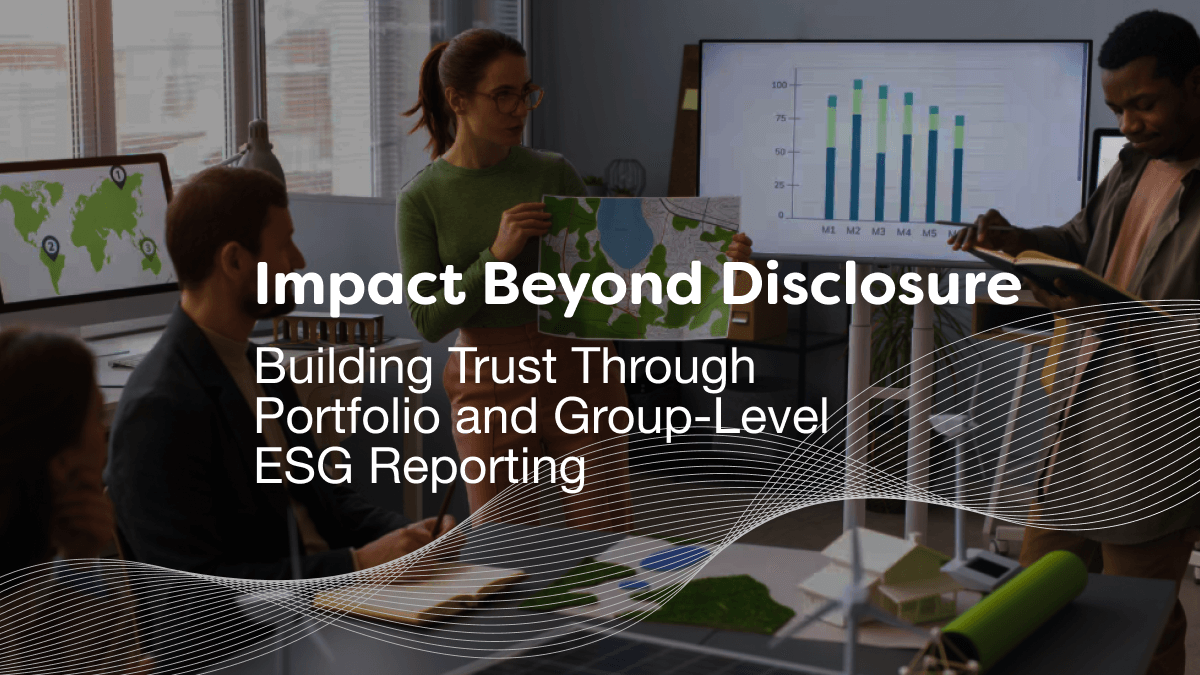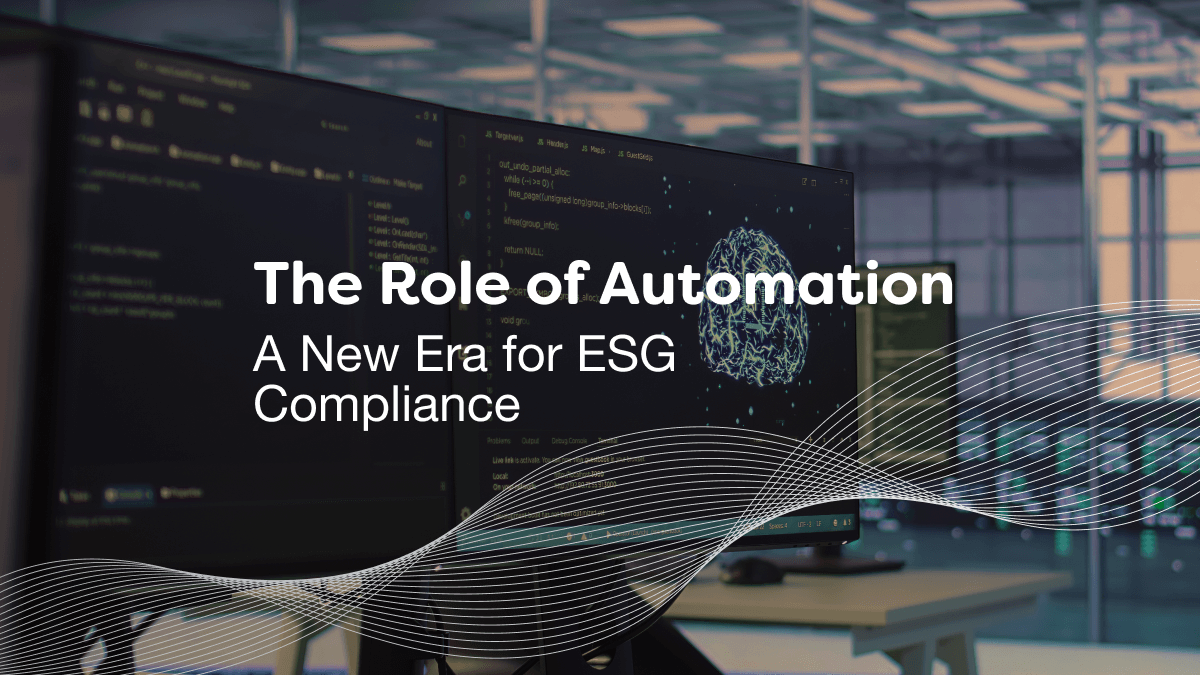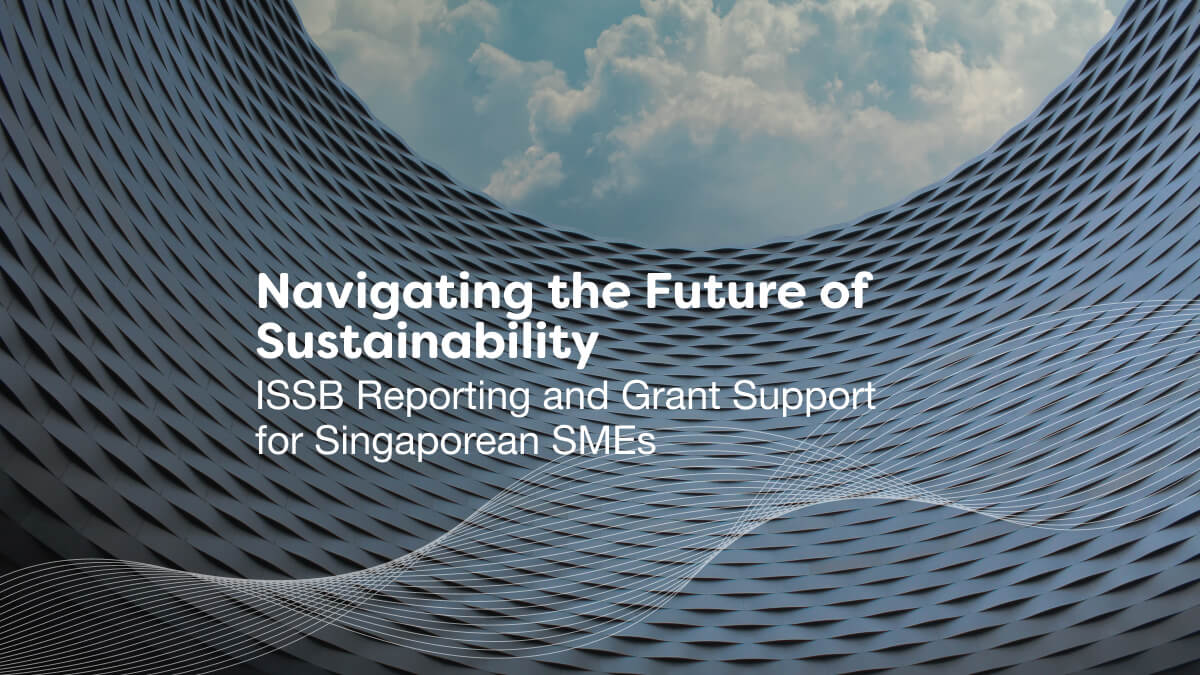Sustainability is no longer just a trend or an option for forward-thinking businesses. It’s rapidly becoming the cornerstone of long-term success. Across the globe, companies of all sizes are recognizing that sustainability reporting is not only a regulatory requirement but a strategic advantage. In Singapore, a country renowned for its progressive economic strategies, Small and Medium-Sized Enterprises (SMEs) are now being encouraged to embrace sustainability reporting under the framework of the International Sustainability Standards Board (ISSB). This marks a pivotal moment for SMEs looking to align themselves with the global push for transparency, accountability and sustainable growth.
But how did we get here, and why should Singaporean SMEs care about ISSB reporting? Let’s explore how ISSB standards and government support can unlock new opportunities and provide your business with a competitive edge in the fast-evolving marketplace.
The Journey of ISSB: What Is It, and Why Is It Important?
Founded by the International Financial Reporting Standards (IFRS) Foundation in 2021, the ISSB aims to establish a global baseline for sustainability reporting. This framework helps companies:
- Report on Climate Risks: Transparency about how environmental challenges, such as climate change, affect a business
- Disclose Transition Plans: Outline how the company plans to adapt to a low-carbon economy
- Demonstrate Financial Resilience: Show how sustainability-related risks and opportunities impact the bottom line.
The ISSB focuses on establishing and enhancing trust among stakeholders. By promoting transparency and accountability in sustainability reporting, it aims to create a framework that allows organizations to communicate their ESG practices effectively. This commitment to trust not only fosters confidence in reporting but also encourages responsible business practices across all sectors. It gives investors the information they need to make informed decisions and pushes businesses to adopt long-term sustainable strategies.
Why Should Singaporean SMEs Care About ISSB Reporting?
While ISSB standards are not yet mandatory for SMEs and non-listed organizations, there are several compelling reasons why small and medium businesses should start integrating these standards now:
1. Safeguard Your Business Opportunities: Did you know that large corporations and multinationals are increasingly focused on the sustainability practices of their entire supply chain? As these companies work to report on their Scope 3 emissions, they’re placing greater emphasis on selecting suppliers who can provide reliable ESG data. For SMEs, this means that providing credible sustainability information isn’t just a bonus, it’s becoming essential to retain and win new business. By reporting sustainability efforts under the ISSB framework, SMEs can demonstrate their commitment to ESG principles, signaling to larger companies that they are dependable and proactive partners. In doing so, you not only strengthen trust with existing clients but also increase your appeal to new business opportunities in an evolving market.
2. Access New Green Financing Opportunities: The world of finance is changing, with more capital being funneled into green investments. From sustainability-linked loans to green bonds, financial institutions are increasingly looking for companies that prioritize ESG reporting. Adopting ISSB standards gives SMEs the credentials to access these green financing options, which often come with favorable terms that can help drive long-term growth.
3. Get Ahead of Future Regulations: While the ISSB standards are not yet mandatory for SMEs in Singapore, the regulatory landscape is constantly evolving. In the coming years, it’s likely that sustainability reporting requirements will be expanded to include more businesses, including SMEs. By adopting ISSB standards now, your business will be ahead of the curve, minimizing disruption when these regulations become mandatory. Early adoption also shows regulators, investors, and clients that your business is proactive, forward-thinking, and well-prepared for the future.
Leveraging Government Support for Sustainability Reporting
To ease the transition to sustainability reporting, the Singaporean government has introduced two key grants designed specifically for SMEs. These grants provide substantial financial support to help companies integrate digital tools and develop comprehensive sustainability reports aligned with ISSB standards.
The Infocomm Media Development Authority (IMDA) Advanced Digital Solutions (ADS) Grant
Through the IMDA ADS Grant, Singaporean SMEs can receive up to 70% grant support to help integrate digital tools into their sustainability operations. This includes implementing systems that streamline data collection, ESG reporting, and sustainability management. By digitizing your processes, your business can reduce manual labor, improve data accuracy, and ensure that reporting is compliant with global standards like the ISSB.
For SMEs seeking to access this grant, approved solutions are listed on the ADS website, providing a variety of tools that meet the requirements of the scheme. Rimm’s flagship platform, myCSO, is proudly approved under this grant, offering a comprehensive solution designed to make ESG management accessible and actionable. With myCSO, companies can efficiently handle everything from carbon tracking to reporting – all within a streamlined digital framework, paving the way for seamless compliance and enhanced sustainability outcomes.
Don’t miss out – Apply for your grant today!
Sustainability Reporting Grant (SRG) by Enterprise Singapore and Economic Development Board
In addition to the ADS grant, the new Sustainability Reporting Grant (SRG), launching in Q4 this year, 2024, offers even more targeted support to help businesses meet evolving sustainability standards. This new grant is designed to assist organizations in enhancing their sustainability reporting capabilities, providing timely resources as ESG reporting requirements grow across industries. Administered by Enterprise Singapore (EnterpriseSG) and the Economic Development Board (EDB), the SRG provides funding to cover up to 70% of the costs associated with producing your first ISSB-aligned sustainability report. This grant can help offset expenses related to:
- External consultancy to guide the reporting process
- External assurance to ensure your report meets the required standards
- Equipment and software to track sustainability data
- Training for your employees on best sustainability practices.
For the SRG by Enterprise Singapore and the EDB, solutions don’t require pre-approval, allowing SMEs the flexibility to select providers that meet their unique needs. To qualify, engage with a solution provider like Rimm for a project proposal or quotation. Before formalizing the contract, ensure the proposal is approved by the grant providers – Enterprise Singapore and the Economic Development Board – to secure grant support.
By utilizing these grants, SMEs can reduce the financial burden of sustainability reporting while also preparing themselves for the future of business in Singapore and beyond. For more information, visit Enterprise Singapore’s website.
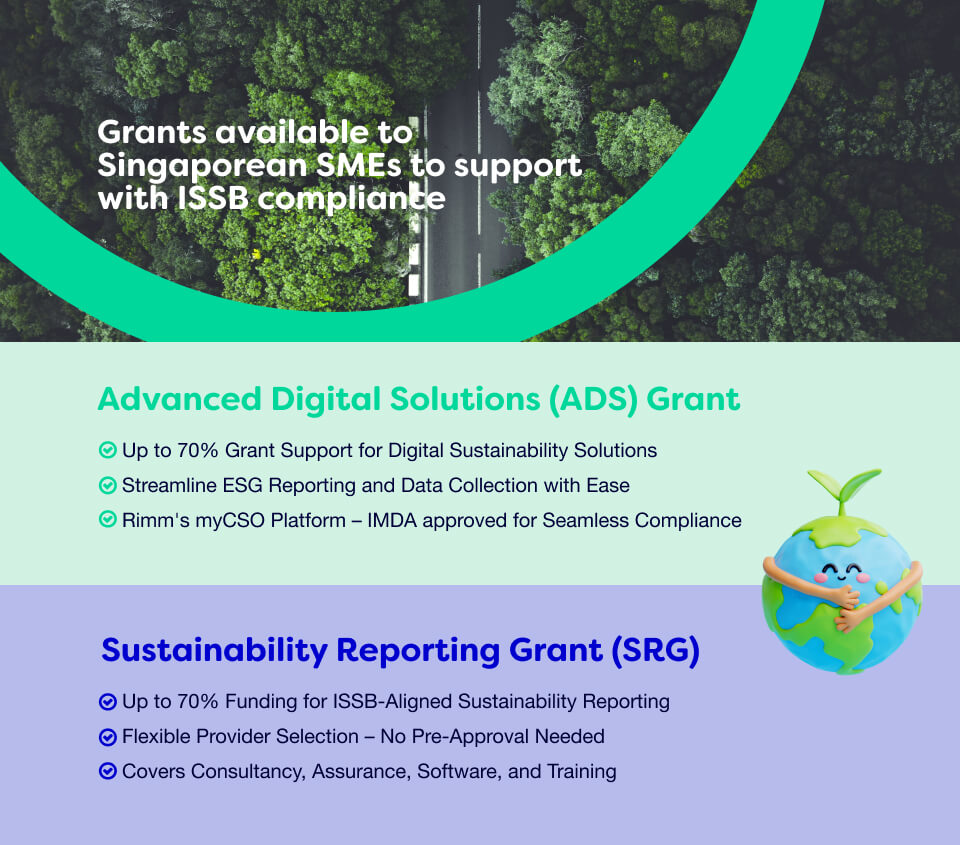
Don’t Wait – Unlock Your Sustainability Potential Today
By embracing sustainability reporting now, you can position your business for success in a rapidly changing world. Take advantage of up to 70% grant support from the Singaporean government and let Rimm help you transform your sustainability efforts into a competitive advantage.
👉 Reach out to us today to learn how Rimm can support your ESG journey.

